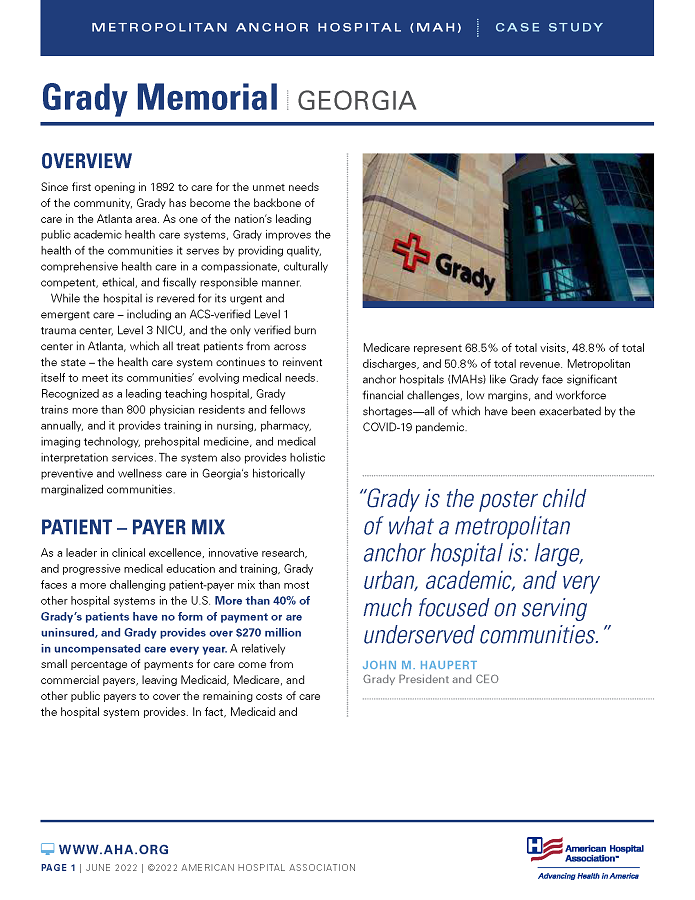

Grady Memorial | Georgia
Metropolitan Anchor Hospital (MAH) | Case Study
Overview
 Since first opening in 1892 to care for the unmet needs of the community, Grady has become the backbone of care in the Atlanta area. As one of the nation’s leading public academic health care systems, Grady improves the health of the communities it serves by providing quality, comprehensive health care in a compassionate, culturally competent, ethical, and fiscally responsible manner.
Since first opening in 1892 to care for the unmet needs of the community, Grady has become the backbone of care in the Atlanta area. As one of the nation’s leading public academic health care systems, Grady improves the health of the communities it serves by providing quality, comprehensive health care in a compassionate, culturally competent, ethical, and fiscally responsible manner.
While the hospital is revered for its urgent and emergent care – including an ACS-verified Level 1 trauma center, Level 3 NICU, and the only verified burn center in Atlanta, which all treat patients from across the state – the health care system continues to reinvent itself to meet its communities’ evolving medical needs. Recognized as a leading teaching hospital, Grady trains more than 800 physician residents and fellows annually, and it provides training in nursing, pharmacy, imaging technology, prehospital medicine, and medical interpretation services. The system also provides holistic preventive and wellness care in Georgia’s historically marginalized communities.
Patient–Payer Mix
As a leader in clinical excellence, innovative research, and progressive medical education and training, Grady faces a more challenging patient-payer mix than most other hospital systems in the U.S. More than 40% of Grady’s patients have no form of payment or are uninsured, and Grady provides over $270 million in uncompensated care every year. A relatively small percentage of payments for care come from commercial payers, leaving Medicaid, Medicare, and other public payers to cover the remaining costs of care the hospital system provides. In fact, Medicaid and Medicare represent 68.5% of total visits, 48.8% of total discharges, and 50.8% of total revenue. Metropolitan anchor hospitals (MAHs) like Grady face significant financial challenges, low margins, and workforce shortages—all of which have been exacerbated by the COVID-19 pandemic.
“Grady is the poster child of what a metropolitan anchor hospital is: large, urban, academic, and very much focused on serving underserved communities.”
John M. Haupert
Grady President and CEO
Grady's Unique Approach to Care
Despite these challenges, Grady has worked hard to serve the community and holistically care for patients. With approximately 80% of patients and employees identifying as Black, Latino, Indigenous, or Asian American, Grady strives to promote equity and address the social determinants of health in every aspect of its work. This work takes on an especially important meaning for the community, as Grady’s main campus is located just blocks from the Reverend Dr. Martin Luther King Jr.’s former home and church. To improve outcomes and reduce disparities and inequities in its communities, Grady has implemented the following approaches:
Holistically Address Health Upstream
Recognizing the need to address patients’ chronic conditions before they become urgent or emergent, Grady launched a network of community health centers that offer primary and specialty care in neighborhoods where people tend to lack access to basic, preventative health care. This includes preventative and wellness care for both physical and mental health. Not only does this approach help patients stay healthier and avoid more severe conditions, but it also helps lower the costs of care in the long term.
Address Social Determinants of Health
The team at Grady recognizes that many factors outside the hospital influence patients’ health. With access to affordable housing and food insecurity being two of the biggest issues facing the Atlanta community, Grady has launched several programs to help support patients and their families. For example, physicians can write prescriptions for healthy food for certain patients to fill through a Food & Medicine Program, while a partnership with Open Hand and The Atlanta Community Food Bank has established an inviting café, teaching kitchen, and food pharmacy onsite – providing a convenient community access point for fresh produce, nutritious meals, and nutrition education.
Utilize Artificial Intelligence to Identify Most At-Risk Patients
Helping prevent hospital readmissions is vital for Grady’s patients and the system’s stability. By calculating billions of datapoints related to patients’ clinical conditions and their socioeconomic information such as transportation issues or predicted medicine adherence issues, Grady is able to identify the patients most at-risk of deteriorating and requiring readmission—then connect those patients to the appropriate care and resources. Through a Mobile Integrated Health (MIH) program, Grady dispatches paramedics and advanced practitioners to patients’ homes to provide a wide variety of services including home health assessment and remote equipment monitoring.
Metropolitan Anchor Hospitals Need Greater Support
Despite the financial challenges MAHs face, as well as the ongoing COVID-19 pandemic which uprooted the nation’s health care system, Grady has continued to accomplish so much for their patients and community. But to be more impactful, adapt to a fast-changing health care landscape, and invest in critical infrastructure, staff, and care services, MAHs like Grady need additional support.
Given Grady’s mission of treating all patients regardless of their ability to pay, Grady experiences extremely thin – and often negative – margins. “We operate on a shoestring,” said John M. Haupert, Grady President and CEO.
While Grady is grateful for philanthropic funding from partners who recognize the value the system provides to the Greater Atlanta area, the funds it receives from the two counties it serves fall woefully short when compared to what many private and public health systems receive. With adequate, sustained federal support, MAHs like Grady will be better positioned to expand successful programs, increase capacity, invest in urgent capital needs, and continually adapt to meet their communities’ evolving medical needs.


